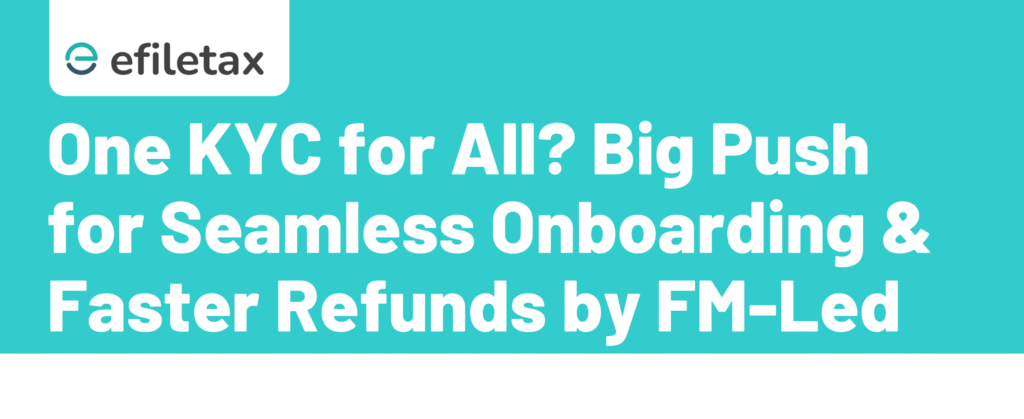
What Is the Universal KYC System?
India’s financial regulators, led by the Finance Minister (FM), are working on a Universal KYC system to simplify onboarding across the entire financial ecosystem—banks, NBFCs, mutual funds, insurers, and stock brokers.
The goal is simple: No more repeating the same KYC process multiple times. This was one of the key topics at the recent Financial Stability and Development Council (FSDC) meeting.
Why Is a Universal KYC Needed?
Currently, every financial institution does its own Know Your Customer (KYC) check—even if you’ve already submitted the same documents elsewhere. This leads to:
- Repetitive verification requests
- Frustration for users
- Delays in access to services
A unified KYC system, backed by a central registry or framework, can eliminate duplication and bring ease of doing business.
Key Highlights from the FSDC Meeting
Led by Union Finance Minister Nirmala Sitharaman, the 29th FSDC meeting proposed a broader digital reform package. Major highlights include:
| Topic | Proposal |
|---|---|
| Universal KYC | Single KYC for all financial services |
| Cyber Resilience | Enhancing real-time defence systems across financial infrastructure |
| Unclaimed Assets Refunds | Speeding up the return of unclaimed deposits, shares, and insurance |
| Cross-Sector Coordination | Greater data sharing and synergy among SEBI, RBI, IRDAI, and PFRDA |
Legal and Regulatory Push
While detailed legislation is awaited, a universal KYC framework would likely operate under:
- Prevention of Money Laundering Act (PMLA), 2002
- SEBI Master Circular on KYC, revised in May 2023
- RBI’s KYC Directions, 2016
This integrated framework will require amendments or alignment across these regulators.
Expert Tip: What This Means for You
“A central KYC will ease onboarding for investors and reduce compliance costs for institutions. The challenge lies in robust data security and privacy protocols.”
— Compliance Consultant, Efiletax
How Will It Work? (Proposed Structure)
- One-time KYC upload via a secure government-backed portal
- KYC is digitally shared across financial service providers
- Real-time updates in case of changes to address, phone, etc.
- Access controlled using Aadhaar-based e-KYC or DigiLocker
Impact on Common Users and Institutions
For Users:
- No need to repeat address proofs, PAN, etc.
- Faster account openings across banks, brokers, MF platforms
For Financial Entities:
- Streamlined customer onboarding
- Reduced verification cost
- Enhanced regulatory compliance
What Happens to CKYC & Existing Systems?
The Central KYC Registry (CKYCR) currently acts as a unified KYC store, but adoption has been low and fragmented. The universal KYC may build over or replace it, with better:
- API-based integrations
- Real-time KYC fetch
- Seamless Aadhaar/e-sign features
Internal Link
Also Read: SEBI’s 2025 Update on Demat Account KYC Norms
External Reference
Visit https://fsdcindia.gov.in for official FSDC updates and meeting reports.
Google Snippet Summary (40–50 words)
Universal KYC system aims to end repetitive verifications across banks, insurers, and brokers. Proposed by FM-led FSDC, it will ease customer onboarding, improve regulatory synergy, and enable faster refunds of unclaimed deposits and shares. A digital-first, centralized registry may replace fragmented KYC systems.
FAQ Section
Q1. Will universal KYC replace Aadhaar-based eKYC?
It will likely work with Aadhaar-based eKYC as one of the ID layers but offer a broader cross-sector scope.
Q2. Is this mandatory for all financial institutions?
Once notified, universal KYC is expected to become mandatory across all regulated entities—banks, NBFCs, AMCs, brokers, and insurers.
Q3. When will it be implemented?
A formal rollout timeline has not been declared yet. Implementation will likely follow after inter-regulator coordination and system readiness.
Final Words
The push for a universal KYC system is a major regulatory reform that will benefit both users and institutions by streamlining verification and improving access. At Efiletax, we stay on top of such reforms to help you stay compliant and save time.